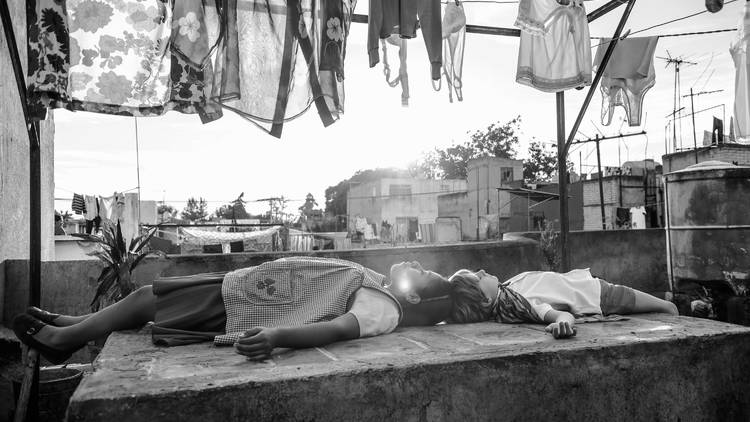With his white-knuckle sci-fi thriller ‘Gravity’, Mexican auteur Alfonso Cuarón extracted an intimate character study from the vastness of outer space. Now he goes in reverse: In his deeply personal black and white marvel ‘Roma’, Cuarón – a director of erotic road-trips (‘Y Tu Mamá También’), dystopian thrillers (Children of Men) and ‘The Prisoner of Azkaban’, the finest entry in the Harry Potter series – unhurriedly observes the smallest parts first, before expanding to gradually reveal the social and political canvas of 1970s Mexico City. It’s the city where he grew up – in a middle-class neighborhood called Roma. A sober and autobiographical elegy about his childhood and the women who raised him (one hardworking live-in maid in particular), ‘Roma’ coalesces out of episodic recollections, digitally filmed with a crisp, grain-free appearance for unsentimental visual conviction.
The domestic helper at the heart of the story is the gentle-natured Cleo (exceptionally talented newcomer Yalitza Aparicio), who works for the affectionate but occasionally livid Sofia (Marina de Tavira, terrific and understated) and the rest of her family. Through transfixing long takes that capture the monotony of Cleo’s chores, Cuarón dotingly honors Cleo’s unsung rituals (just as Chantal Akerman did in her 1975 feminist classic ‘Jeanne Dielman, 23 Commerce Quay, 1080 Brussels’): cleaning, looking after Sofia’s lively four children whom she loves like her own, interacting with her best friend and co-worker Adela (Nancy García García), going on movie dates with her self-absorbed, martial-arts-loving boyfriend, and so on.
At first, the lives of Cleo and Sofia run on parallel yet detached lines, save for regular household interactions and cosy evenings jointly spent in front of the TV, where Cleo is treated as part of the family (sometimes to an awkward degree). But when a marital separation and an unwanted pregnancy upset the lives of the two women from different ranks of the social order, their fates cross paths in a real sense for the first time. And, as the world around their newfound female camaraderie slowly crumbles – with earthquakes, wildfires, violent political demonstrations and one especially traumatic episode of unimaginable grief, filmed with unwavering empathy – ‘Roma’s physical and emotional scope grows and deepens.
The cumulative result of Cuarón’s inquisitive lens (he is also the cinematographer) is an astounding interplay of foreground and background, with artistry that measures up to the meticulously choreographed films of ‘Tokyo Story’s Yasujirô Ozu, and political content akin to Italian neorealist classics like ‘Rome, Open City’. Throughout ‘Roma’, Cuarón demands that you savour each of his frames carefully, eyeballing the corners of the screen for small but significant thematic details intensified by a special kind of surround sound that furthers the film’s immersive, life-like nature. In his personal journey down memory lane (occasionally lightened by humorous anecdotes about a family dog and an extra-wide Ford Galaxie that barely fits in the driveway), Cuarón retroactively examines Cleo’s life in respectful tribute, not guilt-ridden apology. A richly textured masterpiece, ‘Roma’ is cinema at its purest and most human.
